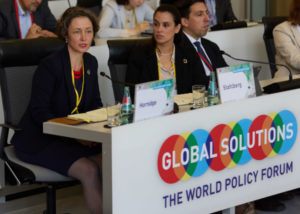This year’s Global Solutions Summit took place in Berlin on 7 and 8 May. As part of various panel discussions and keynote speeches, the participating international representatives from academia, politics, civil society and the private sector discussed and reflected on innovative solutions for dealing with current global challenges.
Scientific and civil society cooperation formats play an important role in socio-ecological transformation. Local design and implementation, as well as inclusive international scientific cooperation, are essential in this context.
Prof. Anna-Katharina Hornidge, Director of IDOS, contributed to a panel discussion on ‘Reforming Multilateralism’. In the session moderated by Kristina Lunz, Centre for Feminist Foreign Policy, she spoke with Mikatekiso Kubayi, Institute for Global Dialogue, Wang Liyong, China Center for Contemporary World Studies, and Lara Tejada Stahlberg, Instituto Igarapé, about the potential of the three consecutive G20 presidencies of India, Brazil and South Africa to strengthen the inclusion of the so-called Global South in multilateral forums and the contribution of non-state actors in multilateral governance formats. Anna-Katharina Hornidge particularly emphasised the role of scientific and civil society cooperation formats, which make an important contribution to the implementation of the socio-ecological transformation. The necessary transformation can only succeed if the processes are organised and implemented locally. Science has an important role to play here, while at the same time efforts must be made to make international scientific cooperation formats more inclusive, thus enabling a diversity of voices on the one hand and building bridges between international forums and local systems on the other. The importance of the local level was also highlighted in the panel discussion on ‘Decentralised Energy Solutions: Local Solutions and Global Impact’. In the panel discussion organised by the Deutsche Bundesstiftung Umwelt, Anna-Katharina Hornidge and international representatives from politics, science and civil society reflected on various perspectives for the implementation of local, sustainable energy systems and the factors that influence the successful implementation of such projects. Dr Axel Berger, Deputy Director (interim) of IDOS, also took an active part in this year’s Global Solutions Summit. In a panel discussion organised by the Trade and Investment Task Force of the Think20 process under the Brasilian G20 presidency, he discussed with other experts how global trade and investment can contribute to tackling inequality within and between countries. A particular focus here was on the Group of 20 and the question of how its member states can play a decisive role in using trade and investment to achieve the Sustainable Development Goals (SDGs). Axel Berger called for more ambition, systemic flexibility and the promotion of a ‘dialogue-based trading system’ in order to protect and further develop the ‘rules-based trading system’.

